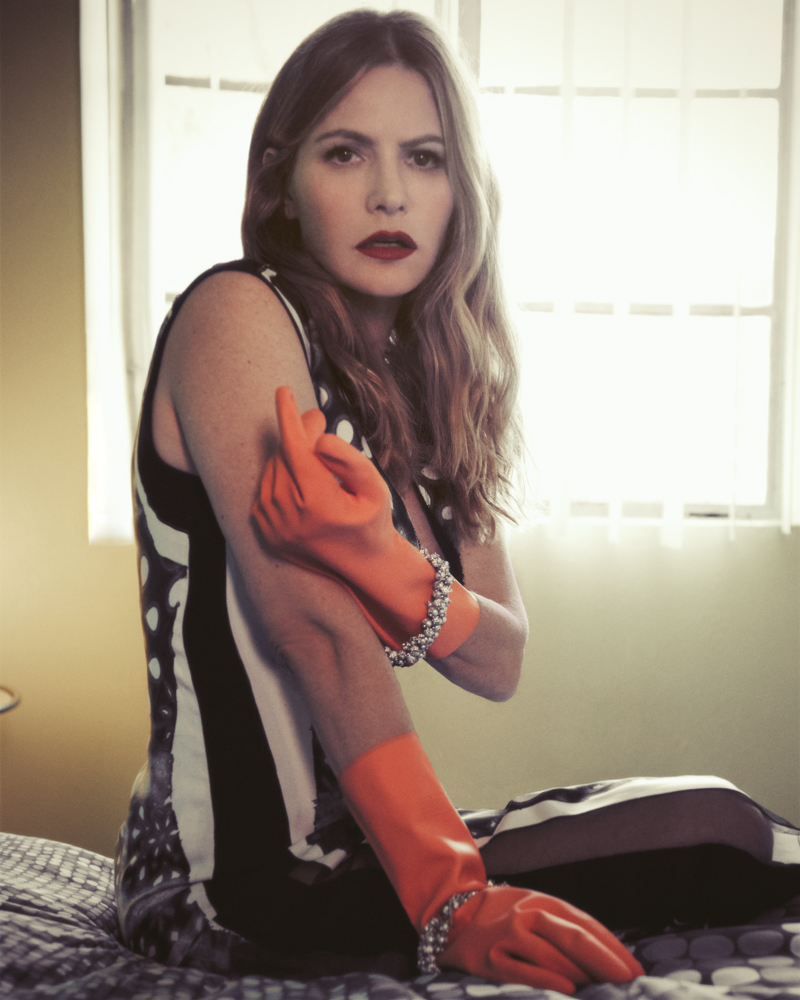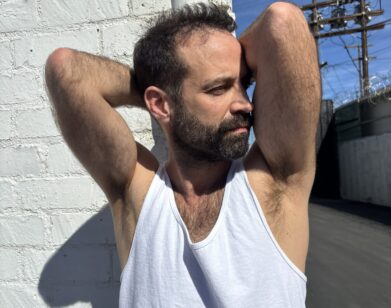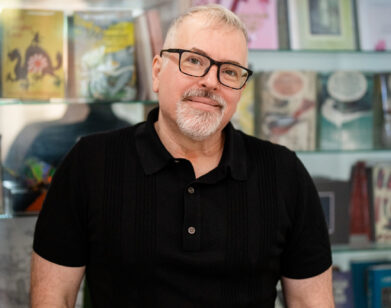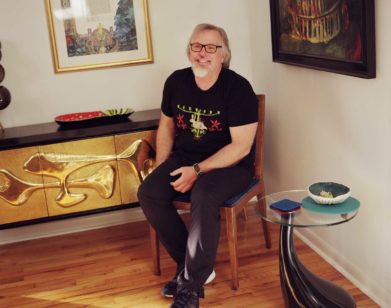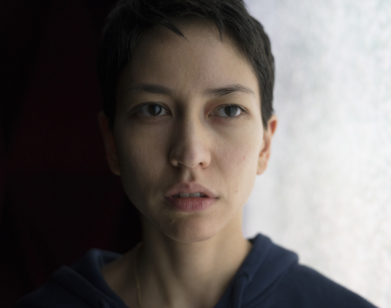Jennifer Jason Leigh is not ready for an alien invasion
Jennifer Jason Leigh is perhaps the epitome of a film critic’s darling. It all began when she starred in Uli Edel’s Last Exit to Brooklyn in 1989, though she first graced screens as Stacy Hamilton in Amy Heckerling’s Fast Times at Ridgemont High a few years earlier. The thriller Single White Female thrust her in front of the beady eyes of a famished public, followed by turns in Mrs. Parker and the Vicious Circle and Georgia, a project she produced with her late mother, screenwriter and actress Barbara Turner, who wrote the script.
Now 56, Leigh has repeatedly been praised for her subtle yet powerful performances, whether on stage, television (she currently co-stars in Netflix’s Atypical) or the big screen. And all the while, she’s been able to live a relatively private life outside the typical confines of Hollywood—her hometown, in fact. In person, she is soft-spoken and grounded, a contrast to the off-center characters she tends to gravitate towards.
In 2001, she released The Anniversary Party, which she wrote, directed and starred in. Six years later, she drew our attention again in Margot at the Wedding, directed by her former husband Noah Baumbach, with whom she shares a child. But it was in Quentin Tarantino’s The Hateful Eight [2015] that she arguably gave the performance of her career—lauded as Leigh’s comeback, the actress earned her first Academy Award nomination.
For her latest project, Leigh plays a psychologist in Annihilation, Ex Machina director Alex Garland’s screen adaptation of Jeff Vandermeer’s Southern Reach trilogy. Following an alien phenomenon simply known as “the shimmer,” Leigh leads an all-female group of scientists—played by powerhouses Natalie Portman, Tessa Thompson, and Gina Rodriguez—on an exploratory expedition that isn’t quite what it seems.
RYMA CHIKHOUNE: What was your reaction to seeing the film?
JENNIFER JASON LEIGH: I really enjoyed it. It’s so dark and dreamy and disturbing. Also, it just makes you think about things that you don’t normally make those connections to. The whole analogy to cancer I found very provocative and interesting.
CHIKHOUNE: What in the sci-fi world do you tend to gravitate towards?
LEIGH: I love Philip K. Dick novels, and I love [David] Cronenberg films.
CHIKHOUNE: Since you’re such a fan of science fiction, have you ever thought about how you think you would react to a scenario like an alien invasion?
LEIGH: I’m sure I would be terrified. I would not volunteer to go in, number one [laughs]. That would not be me.
CHIKHOUNE: Do you remember the first day on set and what it was like?
LEIGH: I think the first day on set was the day of walking into “the shimmer.” We shot in sequence, which was interesting. Alex [Garland] had lots of imagery for us to look at, which was great. But we didn’t have the actual “shimmer.” Although, we did have a lot of things on set that were practical and were real, like a lot of the flowers, animals and monsters. They were there. So it made acting a lot easier.
There are so many things in nature that are profoundly disturbing when you look at them. Even the roots of a tree can be … remember Jane Campion’s movie Sweetie [1989]? She had these shots of the roots of trees, and they’re fascinating and complex and can be upsetting in some emotional way that we don’t even connect to or understand.
CHIKHOUNE: Was “the shimmer” what you expected it to be visually?
LEIGH: It was, actually. I think also we had the benefit of having Alex’s images. He had a lookbook of what he imagined. Some things were real and some were paintings and thing like that. I had an idea of what it would be like, and it’s within that realm.
CHIKHOUNE: The animals were real?
LEIGH: Yes, those were animatronic puppets with men inside them moving them. They were dancers that had studied the form. It’s almost like a martial art I think where they use animal movements. And the bear actually was real. It could move, breathe. You could almost smell it. It really was profoundly real.
CHIKHOUNE: What was it about your character that you were drawn to?
LEIGH: That you don’t know where she is exactly. You don’t know whether she’s sympathetic or unsympathetic, good or bad, and how alone she is. And then she finds herself relating to [Natalie Portman’s character] Lena and actually likes her. I think the weight of being a psychologist who’s trying to compile these groups to go in and pick the best fit and that nobody has really come back has really taken a toll on her. And then she finally decides to go in. She can’t not go in. She can’t just keep sending other people.
CHIKHOUNE: I know you keep a journal for each of your characters. What did this journal look like?
LEIGH: For this one, there was not only journal entries but also a lot of drawings. For some reason, I thought she would express herself through drawing. She’s very secretive in a certain way. So even in the journal, I would draw instead of write if it was about her own personal life.
CHIKHOUNE: I’ve heard you say before that what you love about acting is the make-believe. You’ve said you’re more of an introvert. What is it about acting that brings something else out of you?
LEIGH: It is a way for me to come out of myself. Only I know if it resonates with me, so I can be very private, but I can also pretend to be all these things that maybe I’m not, and usually I’m not. Usually, I’m playing characters that are pretty far away from who I am. But within that, there may be things that are true and only I know that. I don’t know. It’s easier, you know, if you’re at a party and you don’t really know anyone—if you’re not extroverted, it’s really hard to start a conversation. But if you’re at something that’s work-related, it’s easier because there’s some kind of connection. I think that when I act, I know what I can bring in a way and why I’m there. I’m not so self-conscious, I guess.
CHIKHOUNE: It’s freeing.
LEIGH:Yes, it’s freeing. I guess you just said it in a much simpler way [laughs].
CHIKHOUNE: There’s so much talk about artificial intelligence these days. Where do you think the relationship between humans and artificial intelligence is heading?
LEIGH: It’s interesting. You know, there are people who are hacking into their bodies now. They have a chip put in that works the same as an iPhone, where you can scan—like your credit card information is in your fingertip, it unlocks doors. That’s where we’re going. I mean, there are people doing that right now. I think it’s called biohacking.
CHIKHOUNE: Something to read about…
LEIGH: Let’s read about it first [laughs]. Don’t go looking into it right now. Let’s see what happens. I get worried about security, privacy. Everyone is doing everything online now. And then you find out about these huge data hacks. It’s nerve-racking. But artificial intelligence is very intriguing.
CHIKHOUNE: You’ve talked about having a lot of possibilities in terms of the number of projects you may have available since your Oscar nomination for The Hateful Eight. What was it about this role in particular that made you say yes?
LEIGH: Well, I wanted to work with Alex, and I love Natalie Portman as an actor. I also really like sci-fi, so it really was three things that I found really intriguing. It seemed also lovely to do a movie with all women. I really liked that idea. It was something I didn’t really necessarily relate to or understand precisely, and I liked going into the unknown and trusting Alex, knowing I was in great hands and what it would become.
CHIKHOUNE: What was it like working with all women for a change?
LEIGH: The set was great. It really was nice. They’re all really good women and really good actresses and really good people, smart and funny, genuine. Everyone was very supportive and funny and engaging and intelligent. We had great conversations. We had a lot of time together, because the sets were really far away from any trailer, so we were always in a tent together trying to stay warm with these heaters. Everyone really looked out for everyone else.
CHIKHOUNE: In comparison, in The Hateful Eight, you were the only woman in the cast, obviously. You’ve talked about how incredible that experience was, not just with the other actors but working with Quentin Tarantino as well. What was your reaction to what Uma Thurman has shared about her experience on the set of Kill Bill?
LEIGH: You know, I haven’t read the actual article. I’ve heard about it, so I can’t really speak to that. I just felt so loved and so taken care of [working on The Hateful Eight]—it was a very brutal, physical shoot, and I really felt Quentin cared about all of us. He loves his crew. He loves his actors. I can only speak to my own [experience]. I felt incredibly safe. I really did. I think that’s why I could go so far, because I always felt so safe. Of course, every film can be dangerous, but I think on [The Hateful Eight] I really felt like he kept the crew and actors very safe and was very sweet with me, as was everyone.
CHIKHOUNE: You’ve worked consistently as an actor for so long and have so much experience in this industry. I wondered what you thought of the #MeToo movement.
LEIGH: I think it’s great that it’s happening. It needed to happen, and I’m glad I am seeing it happen and that it didn’t continue to perpetuate itself. And it’s not only in this business. It’s an epidemic in our society. It’s something we need to change and examine, and I think that’s happening. It’s amazing that people have been so brave and outspoken.
CHIKHOUNE: It has also led to the discussion of pay equality.
LEIGH: It’s something that I never really thought that much about, because I grew up in a time—my mom always worked, and she always spent more money than she had [laughs]. Aside from being very generous and inspiring, she loved what she did for a living, and she always earned a living. And I’ve always earned a living. I’m not competitive—I’ve never compared salaries, so when I discovered that—and actors are paid well—but then we you discover that, at first you just accept it, because it’s just the norm like we accept so many other things, but now people are saying no, it’s not ok.
CHIKHOUNE: You’ve been asked about your dream role, and you’ve talked about wanting to do a film that your son can see. Have you gotten that possibly yet?
LEIGH: He just asked me again the other day, “When are you going to make a kid’s movie?” [laughs] Nothing could be better for him than a kid’s movie, which I completely get. At this point, I would love that so much, to make something that he would be proud of and excited about, and I could take him to. He keeps asking me, ‘Are there any movies that you’ve made I can see?’ Honestly, I’m racking my brain.
ANNIHILATION HITS THEATERS ON FEBRUARY 23, 2018.

